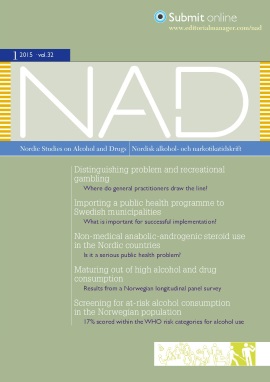NAD 1/2015 (February)

Anabolic-androgenic steroid use in the Nordic countries
How extensive is the non medical use of anabolic-androgenic steroids in the Nordic countries? Is it a public health problem? The analysis by <b>Dominic Sagoe</b> and colleagues included 32 studies that provided original data on 48 lifetime prevalence rates based on a total of 233,475 inhabitants from all five Nordic countries. Three commentaries are also available by Rafn Jónsson and Bilgrei och Sandøy with a reply from Sagoe och Pallesen. Kerstin Stenius also discusses the topic in her editorial.
From cannabis to problem drinking? Use and abuse from youth to adulthood
The transition to adulthood tends to entail changes in consumption of alcohol and drugs. In this Norwegian longitudinal panel study, Christer Hyggen and Torild Hammer study the relationship between cannabis and alcohol use in relation to adult roles and responsibilities.
One in five Norwegians engage in risky drinking
The population study by Torleif Halkjelsvik and Elisabet Storvoll use the AUDIT intrument to estimate the the proportion of the Norwegian population that according to the World Health Organization (WHO) guidelines should be followed up by primary health care, based on three levels of risk drinking. They found that 17% scored whithin these risk categories. (Abstract in English, article in Norwegian)
Hasardspel: var drar läkare gränsen mellan problematiskt och oproblematiskt beteende?
Allmänläkare är nyckelpersoner i bestämmandet av vad som betraktas som spelproblem. Författarna visar hur skillnaderna i problemdefinitioner verkar vara relaterade till vem som vårdar och hur spelandet regleras i tre länder: Finland, Frankrike och Tyskland. De pekar på hur viktigt det är att ha kulturell känslighet då man skapar rekommendationer för sociala interventioner. Studien baserar sig på fokusgruppsintervjuer.
Implementation of a multicomponent Responsible Beverage Service programme in Sweden
Ulrika Haggård and her co-authors identify factors that promote or hinder implementation of a multicomponent Responsible Beverage Service programme in Swedish municipalities. Suggestions on how to elude some of the hindering factors are proposed, e.g. to develop long-time financial plans, to provide better information about the RBS program in full, and to stress the importance of collaboration between representatives from the municipalities, police authorities and owners of on-licenced premises.
Significant others in substance abusers’ change talk in the Finnish Probation Service
This Finnish study by Harri Sarpavaara explores the meanings substance-abusing clients attach to family and friendships during motivational interviewing (MI) sessions in Probation Service. It is suggested that the meaning of significant others should not be overlooked in MI and other substance abuse treatment.
Follow us on social media:

